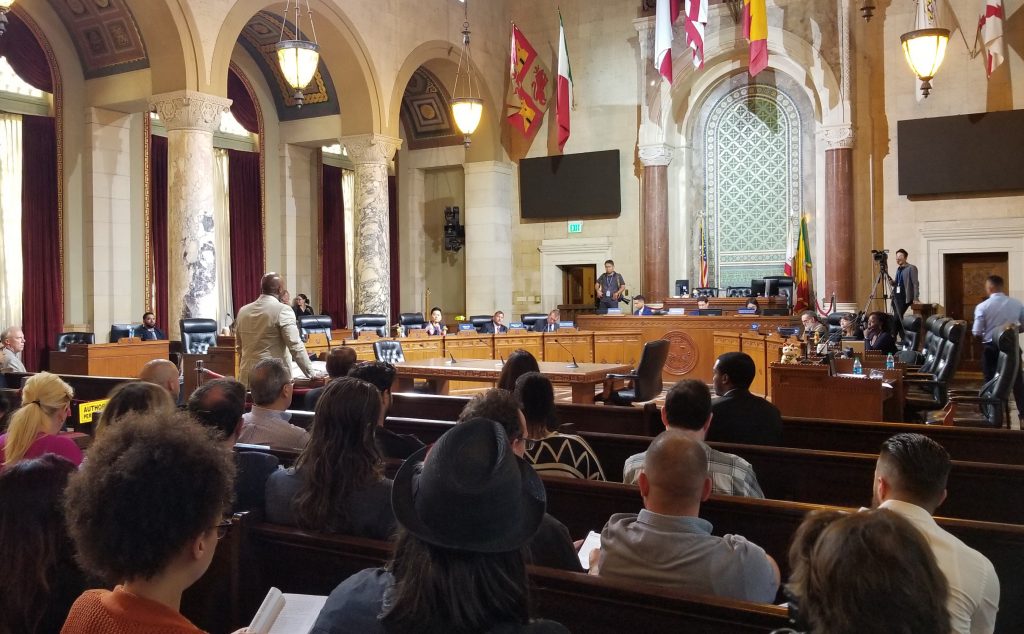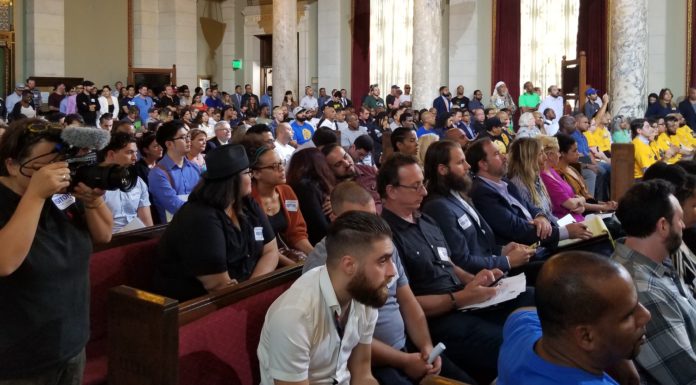LOS ANGELES — A standing-room-only crowd comprised mostly of members or prospective members of the local cannabis industry trekked downtown to greet the five members of the city’s Cannabis Regulation Commission—Robert Ahn, Victor Narro, Philip D. Mercado, Rita Villa, and Misty Wilks—during the commission’s inaugural meeting Monday afternoon in the John Ferrero Council Chamber at Los Angeles City Hall.
The meeting was chaired by Cat Packer, who, as executive director of the Department of Cannabis Regulation, is tasked, along with the commission, with implementing and administering cannabis regulations for the city of Los Angeles. The commissioners, who, like Packer, were appointed last August, gave brief remarks in which they generally asked for patience as they take on a process that from the beginning has gone anything but smoothly.
“It’s not going to be easy,” said Ahn, who was elected to become commission president in a 5-0 vote during Monday’s meeting. Expressing confidence the commission is off to a good start, he characterized the task ahead as “gargantuan,” adding the process is “going to take time, and it’s not going to be a perfect system right off the bat.” Commissioner Villa was elected vice president of the commission, also unanimously.
The meeting allowed Packer to announce a handful of recent amendments to the city’s cannabis regulations, including the removal of a standalone license for delivery and a change to testing lab requirements that will allow more flexibility as they complete the ISO-licensing process.
Packer also announced updates to the application process, including August 1 as the anticipated start date for Phase 2, when the department will begin accepting applications for “Non-Retailer Commercial Cannabis Activity Prior to January 1, 2016, Processing.” Jason Klean from the department further defined Phase 2 as accepting applications for “non-retail social-equity businesses that were supplying the Phase 1 [Proposition-D-compliant] existing medical marijuana dispensaries.” He further described Phase 3 as addressing “social-equity applicants and general applicants that are applying that were until now unknown to the city.”
In an update on Phase 1 businesses, Klean stated, “To date, the city has issued 470 temporary medical approvals to businesses, as well as 470 temporary adult-use approvals. One hundred fifty-five locations have paid their invoices and secured their temporary approval documents from the department. Another 12 locations have invoices that are outstanding and will receive their temporary approval once those invoices are paid. In total, we should have 167 authorized adult-use and medical locations citywide before the close of Phase 1.”
Klean added the department has a number of submitted applications that are deficient but is determined to resolve issues one way or another by the time Phase 2 begins. The city also plans workshops starting in mid-July to help people understand the Phase 2 social-equity process as well as the inspection process for Phase 1 applicants working toward their permanent licenses.

Judging from the preponderance of comments made Monday, the industry’s general response to the commissioners’ call for patience is that patience is running out. This was expressed time and again in the context of the promise of support for the commission going forward.
Donnie Anderson, president the California Minority Alliance, exemplified the perspective of many in the room. “I want to welcome you to work with all of these industry stakeholders,” he said. “I hope you are ready to roll y’all’s sleeves up and get dirty, because this industry has been here for 21 years and we don’t want to wait too much longer. A lot of us have leases that we have been paying rent for nine or 10 months already. Our goal is to help you guys in whatever way you need us. California Minority Alliance is here to help with the social-equity program. We are the guys who brought it to L.A, so we want to you to know we are here to help. That’s what we want to do. Thank you.”
Sarah Armstrong, director of industry affairs for Americans for Safe Access, also pledged her organization’s support, stating, “We have a long history and happy history with this city, and we hope that going forward this commission will share in the satisfaction of bringing forward the biggest social and economic revolution that this city has seen in a long time.”
Virgil Grant, co-founder of the California Minority Alliance, thanked the commission and Packer for their work, but added, “My concern is with the hearings. People like myself—pre-ICOs—have been operating since 2004, one of the oldest operators in the history of medical marijuana. We still have to go through a hearing. We’ve been operating since 2004 to the present day, and we still have to go through a hearing. We’ve been through Prop D and everything the city has asked us to do. So, I’d like you to consider that.”
Several commenters also spoke to the issue of transparency in the city’s licensing process, with an emphasis on fairness in the allocation of licenses and the end to alleged backroom deals that allow a single company to acquire multiple licenses. Indeed, one of the more sustained rounds of applause was generated in response to comments on the subject of license allocation fairness.
Members of the commission serve four-year, staggered terms beginning with the first day of July of the respective years. Per the June 2017 ordinance establishing the commission, “The original five members shall be appointed for such terms as shall cause one term to expire on the date of June 30 in two years, two terms to expire on the date of June 30 in three years, and two terms to expire on the date of June 30 in four years.”
The ordinance also outlined the commissioners’ general duties, as follows:
– The commission shall monitor and review the State’s effort to promulgate cannabis-related laws and regulations and make recommendations to the mayor and city council for the adoption of city laws and regulations pertaining to cannabis-related activity in the city.
– The commission shall implement the laws and regulations adopted by the city council, consistent with the duties of the Cannabis Department set forth in Article 4, relating to cannabis-related activity in city.
– The Commission shall hold hearings related to issuing certificates of compliance to applicants for cannabis-related activity in the city.
There are no additional commission meetings scheduled at this time.
More information about the Cannabis Regulation Commission and the Department of Cannabis Regulation may be found at cannabis.lacity.org.












